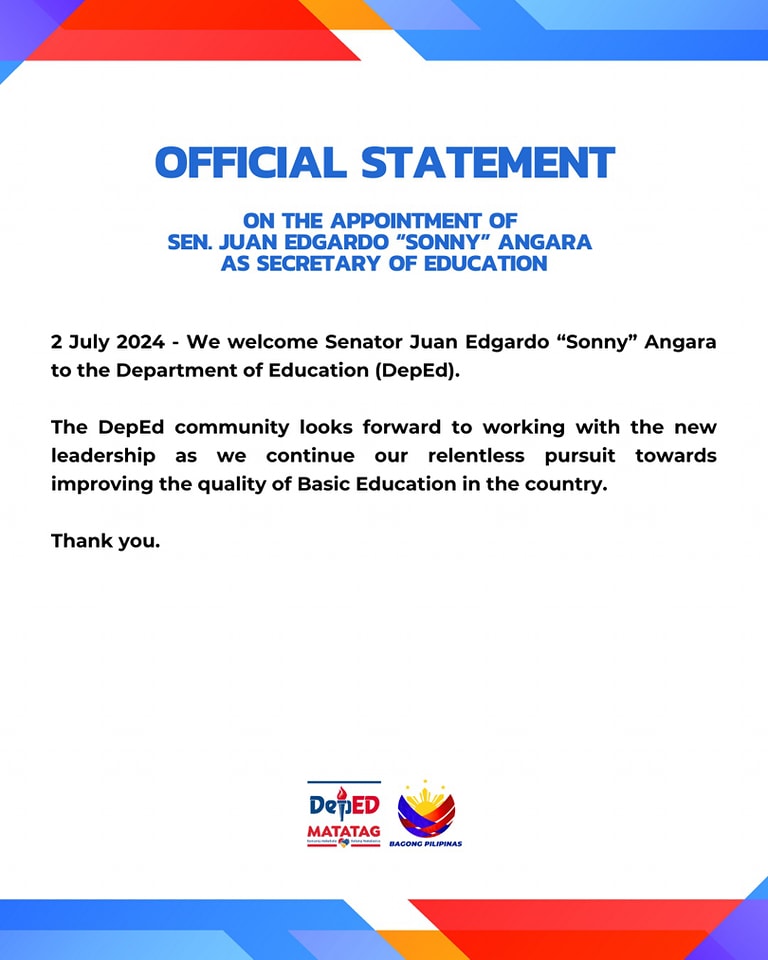
SONNY ANGARA NAMED NEW DEPED SECRETARY
Senator Sonny Angara is the new Secretary of the Department of Education (DepEd), announced the Office of the President on Tuesday. Angara will replace Vice President Sara Duterte after she resigned from the role on June 19.
The senator is among the commissioners of the Second Congressional Commission on Education (EDCOM 2), a congressional body dedicated to evaluating the issues within the Philippine education system and proposing legislative solutions.
For its part, DepEd welcomed Angara in an official statement, "The DepEd community looks forward to working with the new leadership as we continue our relentless pursuit towards improving the quality of Basic Education in the country."
Following Duterte's resignation and Angara's appointment, Smart Parenting surveyed its online community of parents to gather their expectations for the new secretary. This includes their insights on addressing educational challenges in the country, such as lack of classrooms, inneffective curriculum, resource deficiencies, and more.
ALSO READ: Filipino Students Lag Behind In Creative Thinking—New OECD Study
The key priorities of the next DepEd secretary, according to parents
Parents from the 106,000-member Smart Parenting Village and followers of the Smart Parenting Facebook page provided their insights on what the next DepEd secretary must prioritize:
More and improved classrooms
One primary concern among parents is the need for more and better classrooms. One parent wrote, "Upgrade classrooms (heat should not be an excuse to cancel a class, dapat [maayos] 'yung mga classroom to be able to withstand the [hot] weather, hindi lang sa Pilipinas mainit."
Besides quantity, the quality of classrooms is a significant concern. Many classrooms are in disrepair, lacking basic amenities such as proper ventilation, lighting, and furniture. In some rural areas, students attend classes in makeshift structures with leaking roofs and crumbling walls.
So, parents call for better-designed, durable classrooms that provide a safe and comfortable learning environment. They emphasize the need for regular maintenance and upgrades.
Others also advocate for constructing more classrooms to ensure a relatively manageable student-to-teacher ratio. A parent suggested, "Dapat maximum na ang 30 students per class."
Overcrowded classrooms are common in many public schools, with some classes having as many as 50 to 60 students. This makes it difficult for teachers to manage and provide individual attention, creating an environment not conducive to learning.
Inclusive schools
The principle of inclusive education is recognized under the Enhanced Basic Education Act of 2013 and the United Nations Convention on the Rights of Persons with Disabilities, to which the country is a signatory. However, the reality on the ground often falls short of these ideals.
Many schools still lack the resources and infrastructure to accommodate students with disabilities, leading to their marginalization and exclusion. "More facilities and equipment [sic] for SPED," said a parent.
One also suggested, "I-mandate sana sa lahat ng schools na mag offer sila ng Inclusive Special Education Program that has SPED Department, grade level placement, and subjects are graded for kids with special needs."
Parents are also advocating for DepEd to prioritize professional development for teachers, ensuring they are well-equipped to meet the needs of students with disabilities. A parent pointed out the lack of training for teachers on how to properly accommodate students with autism; she said, "Mabigyan sana ng training, seminar man lang lahat ng teachers tungkol sa kung paano maghandle ng batang may special needs lalo ang may autism."
Teachers without adequate training may struggle to differentiate instruction, manage inclusive classrooms, or use assistive technologies effectively. Consequently, students with disabilities may not receive the support they need to thrive academically and socially.
Discontinuing the K-12 curriculum
In recent years, the K-12 educational system in the Philippines has been a subject of debate among parents, educators, and policymakers. Introduced in 2012, the K-12 curriculum extended the country's basic education cycle from ten to twelve years, aiming to align with global standards and improve the quality of education. However, more parents are now advocating for the removal of Senior High School, citing various challenges associated with its implementation.
Some parents believe that the curriculum's emphasis on skills-based learning and technical-vocational education has not been fully realized. While the intention was to make graduates more employable and ready for work, the lack of proper facilities, equipment, and trained instructors has hindered the effectiveness of these programs. As a result, many students do not acquire the practical skills and competencies intended to be the hallmark of the K-12 system. Thus, some parents suggested replacing Senior High with vocational courses.
Facebook/ Smart Parenting
For many Filipino families, particularly those with limited financial resources, the two-year extension of their kid in school has created significant economic strain. The K-12 curriculum itself has also faced criticism for its content and structure. Many parents believe the curriculum is overloaded, placing undue pressure on students. This has resulted in a superficial understanding of subjects, as teachers rush to cover extensive content within limited time.
RELATED: DepEd Launched The K To 10 Curriculum, Reduces Focus From 7 To 5 Learning Areas
Quality Education
The call for quality education in the Philippines reflects parents' concern for their children's future. Addressing their concerns about outdated teaching materials, inconsistent quality of teaching, and systemic inefficiencies within DepEd is crucial for transforming the education system. By implementing reforms that target the said areas, Filipino students will receive the quality education they deserve.
Read here for more information on the SPED curriculum in the Philippines.
2024-07-02T08:12:17Z dg43tfdfdgfd